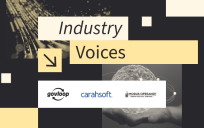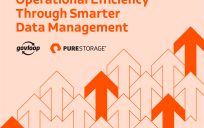Data skills are in vogue, and the demand for employees who can analyze and communicate data findings isn’t fading.
This doesn’t mean you have to become a data scientist or statistician overnight. In fact, quite the opposite. If you’re wondering how you can position yourself and your team to navigate data-centric workplace requirements, the Government Accountability Office (GAO) could be the model you’re looking for.
“When we talk about data literacy for an audit organization, we really try to focus on what does it mean to support the kind of professional judgments that auditors need to make,” said Taka Ariga, the audit institution’s first Chief Data Scientist.
Speaking during a keynote at GovLoop’s recent virtual event, Ariga shared the three pillars of GAO’s data strategy: governance, data science and data literacy. His talk came on the heels of the agency publishing its first artificial intelligence (AI) oversight and accountability framework. The goal is to drive conversations around evidence-based verification of AI systems.
“As federal programs increasingly integrate algorithmic capabilities, data literacy becomes even more important when AI systems are often opaque,” he noted. “Making sure that humans [are] capable of [remaining] in the proverbial ‘driver’s seat’ is actually a key to successful implementation of AI solutions.”
That’s why proper training for government employees, particularly auditors providing oversight, is essential. Ariga emphasized the strategic approach to not only gain buy-in from senior leaders and middle managers but also the intended audience for the data literacy training: analysts.
“There is an opportunity for them to strengthen their tradecraft,” he said. “It helps them to sort of navigate a crowded career market.”
In the private sector, for example, there is an expectation for professionals in this space to marry the audit and data analysis tradecrafts in ways that can be tested and verified. At GAO, employees recognize the traditional way is no longer sufficient in a world dominated by cloud services and AI, Ariga said.
Filling Training Gaps, Gaining Employee Buy-In
Gaining buy-in is not about being punitive. There’s no messaging that says if employees don’t augment their current skills with data literacy, then they’ll be irrelevant. Upskilling doesn’t involve shoving PowerPoint slides and endless hours of training materials onto employees either. Instead, there is a clear focus on the “why” of training and “how” it will benefit agency outcomes.
“We really try to incentivize them as, here is an opportunity for you to grow your career,” Ariga said. Bolstering data literacy puts GAO employees in a position to not only make informed recommendations but to have a seat at the table to facilitate solutions, impact policy suggestions and drive accountability across federal programs.
How GAO impacts audits of tomorrow is the question Ariga is after.
“We want to make sure that our upskilling process is specifically relevant to the audit tradecraft in terms of how we answer a researchable question,” Ariga said.
This is about incorporating aspects of data science into an analyst’s daily engagements and knowing how to audit artificial intelligence algorithms, a blockchain or other digital information systems when the need arises. Because, ultimately, the federal government can’t afford to get it wrong.
Beefing up GAO’s data literacy efforts involves creating a curated curriculum with different learning paths. The goal is to ensure that techniques or capabilities that analysts learn are relevant to their domain or area of expertise. In other words, if you are an analyst focused on physical infrastructure or energy or national defense issues, there are different considerations relevant to the type of analytical techniques that might apply to those separate domains. The bottom line: GAO did not want to treat all analyses or domains the same.
On-demand reinforcement, coupled with a sandbox environment for hands-on learning and content curation are foundational for developing the data literacy program, Ariga said. The focus is applying data to the audit tradecraft in a way that is transparent, explainable and linear.
Think of it this way: If the government is accusing someone of committing fraud, it must be able to explain the recommendations or conclusions.
Getting Middle Managers On Board
At GAO, there are a lot of digital natives coming into the agency. They can do many data-centric duties, and they’re comfortable with open source tools, the notion of AI and machine learning and data-driven, evidence-based policymaking processes.
But they might not always understand the “why” that’s driving the work because they are newer in their career path.
“What we are trying to impact here are the middle management layer,” Ariga said. “These are the cohort that not only have the responsibility of knowing why we do things but also have to know how we do things.”
Unlike rank-and-file employees and senior leaders, middle managers typically have different levers that influence their outlook and decision-making.“They are incentivized by meeting budget, meeting quality and meeting time,” Ariga said.
He’s exploring how the agency can enable middle managers to develop the type of data literacy that will augment quality and possibly reduce time and ultimately budget. This isn’t about requiring managers to memorize machine learning algorithms but providing a path for meeting GAO’s mission and objectives in a more efficient, economical and equitable way.
Ariga highlighted work with the agency’s financial management assurance team as an impactful win. That particular team is responsible for general accounting issues. Using data science techniques, they were able to cut down the time it takes to stage and prep data for calculating things such as federal debt and interest from months down to seconds.
“Senior executives understand the reason why we need to have a data literate workforce for GAO to remain relevant in the 21st century,” he said.
Messaging is key, and Ariga knows that well. Discussing data literacy in the context of budget, quality and time can certainly bolster your argument. As you consider how GAO’s approach might inform data literacy efforts at your agency, try using this question Ariga shared to guide conversations: If we give time back to you, what would you do with that time?





Leave a Reply
You must be logged in to post a comment.